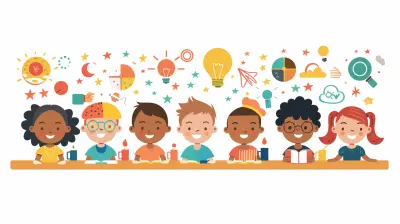Rethinking Assessment Through Educational Research
10 August 2025
Let’s be honest—most of us don’t look back at exams with fond memories. Whether it was cramming the night before or anxiously flipping through pages of multiple-choice questions, traditional assessments have often been more about memorizing facts than actually understanding them. For decades, education systems across the world have leaned heavily on standardized testing and grades to measure student success.
But here’s the thing: Times have changed, and so have our students.
Educational research has thrown a spotlight on the need to rethink assessment—not just tweak it, but completely overhaul the way we understand and measure learning. Let's dive deep into what that actually means, why it’s necessary, and how it could change education as we know it.
The Problem With Traditional Assessments
They're One-Size-Fits-All
Picture this: you’ve got 30 students in a classroom, each with different learning styles, backgrounds, strengths, and weaknesses. Now hand them all the same test and expect a fair measurement of what they’ve learned. Does that make sense? Not really.Standardized tests and paper-based exams tend to favor a narrow skill set—usually rote memorization, time management under pressure, and the ability to sit still for an hour or more. But what about creativity, collaboration, problem-solving, emotional intelligence, or even curiosity? These don't show up so easily in a multiple-choice format.
They Encourage Shallow Learning
Let’s face it. When students know they’ll be tested on definitions and dates, they study to pass—not to understand. Learning becomes less about curiosity and more about survival. "Will this be on the test?" becomes the most asked question in class.This test-centric approach can lead to short-term information retention and long-term disengagement. Once the test is over, that information? Gone. Like yesterday’s lunch.
They Penalize Diversity
Cultural differences, language barriers, neurodiversity, and disability all play roles in how students process and present knowledge. Traditional assessments often overlook these factors, unintentionally favoring students who fit a certain mold—and that’s a big problem.
So, What’s the Alternative?
The good news? Educational research is painting a much more colorful and inclusive picture of assessment. We’re now seeing a shift from standardized testing toward more dynamic, personalized, and equitable forms of evaluation. It's not just a trend—it's a movement.So, what does rethinking assessment actually look like?
The Rise of Formative Assessment
Feedback Over Grades
One of the biggest game-changers is the focus on formative assessments. Unlike summative assessments (think final exams), formative assessments are ongoing. They provide real-time feedback to help students improve while learning is still happening.Ever written a rough draft and gotten feedback before submitting the final version? That’s formative assessment in action. It encourages growth, not just judgment.
Examples in Action
- Exit tickets (quick reflections at the end of class)- Peer reviews (students giving each other feedback)
- One-on-one check-ins with teachers
- Learning journals that track progress over time
These aren’t just feel-good strategies—research shows they actually boost learning outcomes. Students become more engaged, motivated, and aware of their own progress.
Emphasizing Competency Over Completion
Mastery Learning
The idea here is simple but powerful: students should move forward when they’ve actually mastered a concept, not just because the calendar says it’s time to move on.Competency-based education allows students to progress at their own pace. Some may zoom through math but need more time on reading. And that’s okay.
This approach respects the individuality of each student and promotes deeper, more meaningful learning. It shifts the goal from “finishing the curriculum” to “actually understanding it.”
Authentic Assessment: Learning That Looks Like Life
Real-World Tasks
If you’ve ever asked, “When am I going to use this in real life?”—you’re not alone. That’s exactly why authentic assessment was born.Instead of random test questions, students might:
- Design a business plan
- Write a speech for a real audience
- Create a website or podcast
- Solve a community issue
These tasks mimic real-world challenges and require students to apply what they know in creative, collaborative ways. It’s messy, sure—but it’s also meaningful.
The Power of Portfolios
Portfolios give students a space to showcase their growth over time. Think of it like an artist’s sketchbook—only it could include essays, videos, projects, coding scripts, reflections, and more.It’s an evolving story of what the student has learned, how they’ve learned it, and how they can communicate that to others.
Making Assessment Equity-Centered
Culturally Responsive Assessment
Educational research keeps reminding us: culture deeply influences how students learn and show what they know.Culturally responsive assessment means recognizing and valuing diverse ways of thinking and expression. It invites students to bring their full, authentic selves into the learning space. That might mean allowing presentations in a student’s native language, incorporating local history into projects, or giving options for how students demonstrate understanding.
It’s not about lowering standards. It’s about removing unnecessary obstacles.
Universal Design for Learning (UDL)
UDL is a framework that ensures assessments are accessible to all students, including those with disabilities. It encourages flexibility in how students access content and show what they’ve learned.For example: offering audio versions of a test, allowing oral presentations instead of written exams, or providing visual supports.
It’s about leveling the playing field without watering down the challenge.
Technology: A Double-Edged Sword?
Personalized Learning at Scale
When used right, technology can offer incredible assessment opportunities. AI-driven platforms can adapt in real-time based on how a student is doing. No two students get the exact same questions—they get what they need, when they need it.This level of personalization was unthinkable a decade ago.
The Risk of Data Overload
But there's a flip side. More tech means more student data, and that raises questions about privacy, algorithmic bias, and data fatigue. Just because we can track every keystroke doesn’t mean we should.Educational research urges caution. We need to balance innovation with ethics.
The Role of Teachers in Rethinking Assessment
Teachers aren’t just implementers; they’re innovators. They're the ones turning theories into real classroom strategies. But for this shift to work, teachers need:- Time to design meaningful assessments
- Training on new methods and tools
- Support from administrators and policy-makers
This isn’t about dumping more on teachers’ plates—it’s about empowering them to be assessment designers, not just graders.
Shifting the Mindset Around Failure
From Failure to Feedback
One of the most radical—and necessary—shifts is how we treat failure. Traditional assessments often treat mistakes as the end. You got the question wrong? Too bad. Move on.But educational research shows us that learning is inherently messy. Mistakes are goldmines of feedback.
When assessments are designed for learning, not just evaluation, failure becomes part of the process. It's not a dead end—it’s a stepping stone.
Students as Co-Creators
Rethinking assessment also means inviting students into the process. What if students helped design the rubric for their projects? What if they reflected on their own growth and set their own goals?When students have a voice in how they’re assessed, they take more ownership of their learning. It builds motivation, metacognition, and confidence.
And let’s be real—who knows more about a student’s learning journey than the student themselves?
Reimagining the Future of Assessment
We’re at an exciting crossroads. Educational research is showing us that assessments can be more than tools of judgment—they can be instruments of growth, equity, and empowerment.But change won’t happen overnight. It requires courage, creativity, and commitment from everyone involved—teachers, students, parents, researchers, and policy-makers.
So let's stop asking, "How do we test better?"
And start asking, "How do we understand learning better?"
Because at the end of the day, the goal isn’t to sort students—it’s to support them.
Final Thoughts
Rethinking assessment isn’t just an academic idea—it’s a call to action. It challenges us to unlearn outdated practices, embrace new possibilities, and center our students in everything we do. Assessment shouldn’t be something students fear—it should be something that fuels their growth.So next time you hear the word “test,” don’t think of Scantrons or number two pencils. Think of progress. Think of potential. Think of possibility.
Because that’s what assessment, at its best, is really all about.
all images in this post were generated using AI tools
Category:
Educational ResearchAuthor:

Madeleine Newton
Discussion
rate this article
1 comments
Ella Gray
This article provides valuable insights into transforming assessment practices using educational research. By rethinking our approaches, we can foster deeper learning and more accurately measure student understanding, ultimately enhancing the educational experience for both teachers and learners.
August 17, 2025 at 11:45 AM

Madeleine Newton
Thank you for your insightful comment! I'm glad you found the article helpful in exploring innovative assessment practices to enhance learning.


